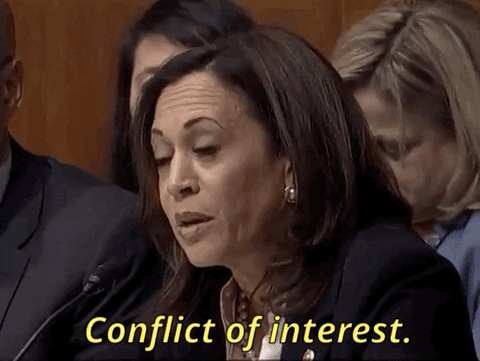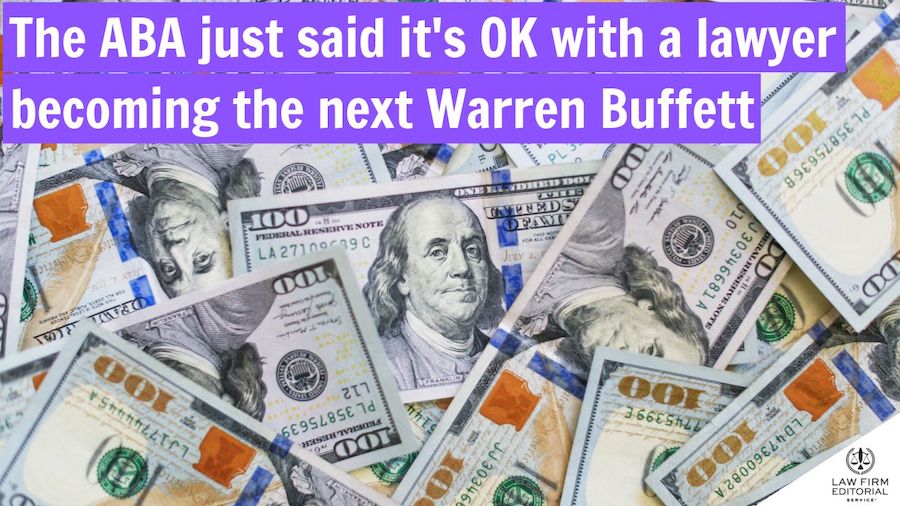The ABA’s latest ethics opinion gives the ethical green light to lawyers investing in nonlawyer-owned law firms.
Who wouldn’t like to be Warren Buffett?
The “Oracle of Omaha” is known to be one of the savviest investors in modern history.
He is also one of the most beloved.
His warm, pleasant demeanor is in stark contrast to those of successful businesspeople like Jeff Bezos and Elon Musk.
His annual letters to Berkshire Hathaway shareholders are must-reads by non-shareholders interested in learning how to run a business and how to invest intelligently.
He eats breakfast from McDonald’s EVERY morning on his way to work.
He drinks FIVE cans of Coke per day. (He told Fortune in 2015, “I’m one quarter Coca-Cola.”)
And, oh yeah, as of today his net worth is in the low nine figures.
While you will never approach that eye-watering net worth or develop his folksy charm, the American Bar Association apparently won’t stop you if you want to build wealth the way Mr. Buffett did: by investing in businesses.

In this case, we’re talking nonlawyer-owned law firms.
With Arizona and Utah recently relaxing their prohibitions on nonlawyer ownership of law firms, there was an open question of whether a lawyer practicing in a state that barred nonlawyer ownership of law firms could make passive investments in nonlawyer-owned law firms in Arizona and Utah without running afoul of their own jurisdiction’s Rules of Professional Conduct.
In its Formal Opinion 499, “Passive Investment in Alternative Business Structures” (Sept. 8, 2021; PDF available here), the ABA said that kind of investment should not pose an ethics issue for the investing lawyer in their home jurisdiction.
Specifically, the ABA said:
“A lawyer admitted to practice law in a Model Rule jurisdiction may make a passive investment in a law firm that includes nonlawyer owners operating in a jurisdiction that permits such investments provided that the investing lawyer does not practice law through the [law firm], is not held out as a lawyer associated with the [law firm], and has no access to information protected by Model Rule 1.6 without the [law firm’s] clients’ informed consent or compliance with an applicable exception to Rule 1.6 adopted by the [law firm’s] jurisdiction.”
(If you are curious, or happen to be pining for the days when you sat in civil procedure class as a law student, the ABA arrived at its conclusion by relying on choice-of-law principles set forth in Model Rule of Professional Conduct 8.5(b)(2).
Under those principles, the applicable ethics rules regarding a lawyer’s actions are those of the jurisdiction in which the lawyer’s conduct occurred, unless the predominant effect of that conduct is in another jurisdiction.
The ABA considers a lawyer’s passive investment in a nonlawyer-owned law firm as occurring in the jurisdiction permitting nonlawyer ownership, thus the lawyer’s home jurisdiction’s ethics rules would not control.)
Ethics Opinion 499 makes clear that a lawyer’s passive investment in a nonlawyer-owned law firm, without more, does not mean the lawyer is deemed to be practicing law through the firm.
That being said, according to the ABA, conflicts of interest could arise if a lawyer acted as an advocate against a client of a nonlawyer-owned law firm the lawyer invested in, or represented a business in a transactional matter requiring negotiation with a client of the law firm.

Whether lawyers flock to invest in nonlawyer-owned law firms outside of the jurisdictions they practice in remains to be seen. But with its Formal Opinion 499, the ABA has seemingly removed a barrier that might have dissuaded some lawyers from doing so.
While you will never be the investor Warren Buffett is, the ABA’s Model Rules of Professional Conduct — for now — won’t stand in your way if you choose to begin building your investing empire, or choose to add to it, through investing in nonlawyer-owned law firms.
The ABA’s recent ethics opinion, however, was silent on the merits of lawyers consuming large quantities of McDonald’s food and Coca-Cola while pursuing investments in nonlawyer-owned law firms.


